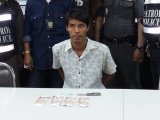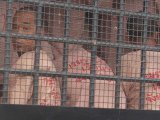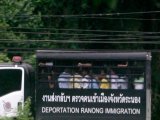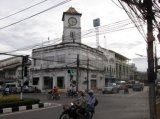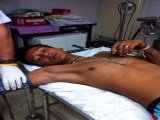PHUKET: The Thai government and parliament should reject a proposed blanket amnesty law that would prevent prosecutions of those responsible for serious human rights abuses, Human Rights Watch said today.
On October 18, 2013, the House of Representatives Vetting Committee expanded a more limited amnesty bill already under consideration to include leaders from past political protests, soldiers, and authorities who carried out the crackdown on protesters.
''The proposed amnesty would allow officials and protest leaders who have blood on their hands to go unpunished,'' said Brad Adams, Asia director at Human Rights Watch.
''By whitewashing past abuses, the government denies justice to victims and tells future abusers they have little to fear.''
Members of parliament from the ruling Pheu Thai Party, who dominate the 35-member Vetting Committee, passed an amendment to provide a blanket amnesty to all people involved in political unrest, including protest leaders, military personnel, and authorities responsible for ordering and commanding the crackdowns.
This worsened the version of the draft law approved by the House of Representatives in August, which only provided full amnesty to protesters who have been charged, prosecuted, and convicted for actions against the state from the period between the coup that ousted then-prime minister Thaksin Shinawatra on September 19, 2006, and the anti-government Red Shirt protests that ended on May 10, 2011.
Current Prime Minister Yingluck Shinawatra, Thaksin's sister, had pledged that she would investigate and prosecute all those responsible for the 2010 violence, including soldiers and their commanders.
''To appease the military and promote a political agenda, Prime Minister Yingluck and her Pheu Thai Party are apparently willing to throw out the window the solemn promises they made to ensure justice for victims of political violence,'' Adams said.
On October 18, 2013, the House of Representatives Vetting Committee expanded a more limited amnesty bill already under consideration to include leaders from past political protests, soldiers, and authorities who carried out the crackdown on protesters.
''The proposed amnesty would allow officials and protest leaders who have blood on their hands to go unpunished,'' said Brad Adams, Asia director at Human Rights Watch.
''By whitewashing past abuses, the government denies justice to victims and tells future abusers they have little to fear.''
Members of parliament from the ruling Pheu Thai Party, who dominate the 35-member Vetting Committee, passed an amendment to provide a blanket amnesty to all people involved in political unrest, including protest leaders, military personnel, and authorities responsible for ordering and commanding the crackdowns.
This worsened the version of the draft law approved by the House of Representatives in August, which only provided full amnesty to protesters who have been charged, prosecuted, and convicted for actions against the state from the period between the coup that ousted then-prime minister Thaksin Shinawatra on September 19, 2006, and the anti-government Red Shirt protests that ended on May 10, 2011.
Current Prime Minister Yingluck Shinawatra, Thaksin's sister, had pledged that she would investigate and prosecute all those responsible for the 2010 violence, including soldiers and their commanders.
''To appease the military and promote a political agenda, Prime Minister Yingluck and her Pheu Thai Party are apparently willing to throw out the window the solemn promises they made to ensure justice for victims of political violence,'' Adams said.



